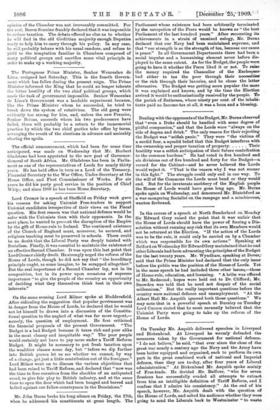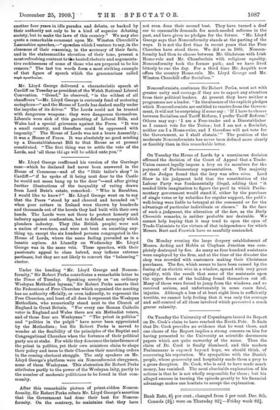On Tuesday Mr. Asquith delivered speeches in Liverpool and Birkenhead.
At Liverpool he warmly defended the measures taken by the Government for national defence. " I do not believe," he said, " that ever since the close of the great war nearly a century ago the Navy and the Army have been better equipped and organised, each to perform its own. part in the great combined work of national and Imperial defence, than they are to-day, after four years of Liberal administration." At Birkenhead Mr. Asquith spoke mainly of Free-trade. He derided Mr. Balfour, "who for seven Sessions has successfully evaded all attempts to extract from him an intelligible definition of Tariff Reform, and I confess that I admire his consistency." At the end of his speech, however, Mr. Asquith dealt with the question 0 the House of Lords, and asked his audience whether they were going to send the Liberals back to Westminster " to waste another four years in idle parades and debate, or backed by their authority not only to be a kind of superior debating society, but to make the laws of this country." We may also quote a remarkable comment upon Mr. Winston Churchill's Lancashire speeches,—" speeches which I venture to say, in the closeness of their reasoning, in the- accuracy of their facts, and in the statesmanlike elevation of their tone, present a most refreshing contrast to tke heated rhetoric and argumenta- tive recklessness of some of those who are prepared to be his censors." The last ten words form a most striking example of that figure of speech which the grammarians called
trap& wpoolodar.



































 Previous page
Previous page